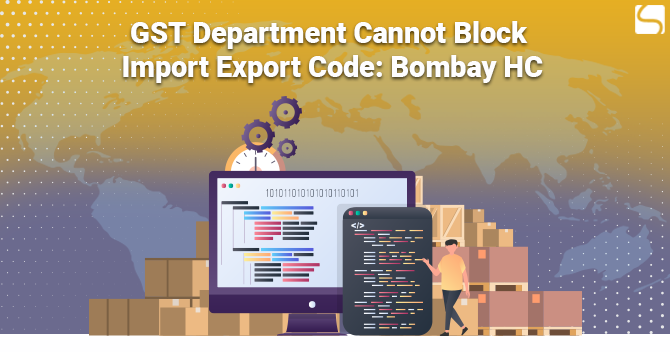GST Department Cannot Block Import Export Code: Bombay HC

Shivani Jain | Updated: Dec 16, 2020 | Category: GST, IEC, News
Recently, the division bench of Justice Ujjal Bhuyan and Abhay Ahuja of the Bombay High Court held that the suspension or cancellation of the Importer Exporter Code can only be done by DGFT or Director General of Foreign Trade under Foreign Trade (Development and Regulation) Act 1992. That means the GST Department cannot block Import Export Code.
In this blog, we will discuss about the ruling that GST Department cannot block Import Export Code.
Table of Contents
Concept of Import Export Code
The term Import Export Code or IEC denotes a ten digits unique identification number given to the individual who wants to start business operations at the global level. That means obtaining IEC Registration is a must requirement for dealing in the import and export of goods.
Further, only the Director General of Foreign Trade has the authority to issue IEC in India. Also, it shall be considerate to mention that this code has lifetime validity and does not require any renewal.
Facts of the Case
The petitioner, Mr Siddharth Mandavia, is the Proprietor of the Sole Proprietorship Firm, named M/s XS Components, which deals with the business of import and export of several products, such as Footwear, Garments, Leather Accessories, etc. Also, the petitioner holds IEC (Import Export Code) with him.
However, the IEC of the petitioner was suspended and blocked by the respondent, i.e., the Goods and Service Tax Department. Further, due to the continuous blockage of the IE Code, the petitioner was not able to receive drawback incentive up to Rs 851374, IGST (Integrated Goods and Service Tax) Refund of Rs 5800601, and MEIS (Merchandise Export Incentive Scheme) Refund of Rs 4598702.
As a result, the petitioner had lost many of his overseas buyers and export orders. Therefore, the petitioner prayed before the Hon’ble High Court to direct the GST Department, i.e., respondent, to unblock IEC, together with other directions.
Contentions from Respondent Side
The GST department alleged that the exporter was seeking to obtain an “ineligible return” and was seeking to “defraud” the federal government as well. Therefore, the tax department started checking the account and blocked the IEC code.
Further, the GST department contended that it had found a lot of discrepancies in the entry of the tax credit score as well.
Section Invoked by GST Department
The GST or Goods or Service Tax Department had invoked the selected part of section 86A of the CGST Act.
Concept of Input Tax Credit
The term “Input Tax Credit” denotes a situation wherein the taxpayer can reduce the amount already paid on inputs at the time of paying tax on outputs and pay the remaining amount.
Further, the condition applicable to the claim of ITC are as follows:
- Dealer needs to be in possession of the Tax Invoice;
- Goods and Services have been received;
- Returns have been filed on a timely basis;
- Suppliers have paid the taxes to the government;
Therefore, Input Tax Credit or ITC is primarily a part of the tax paid by the taxpayer that can be utilised to set off future tax legal responsibilities.
Rulings of the Court
The division bench of the Bombay High Court[1] held that the blocking of the Import Export Code by the GST Department is illegal and invalid, and only the DGFT or the Director-General of Foreign Trade has the power to revoke, suspend, and cancel the IEC issued. Further, the same can only be done under the provisions of the Foreign Trade (Development and Regulation) Act 1992.














